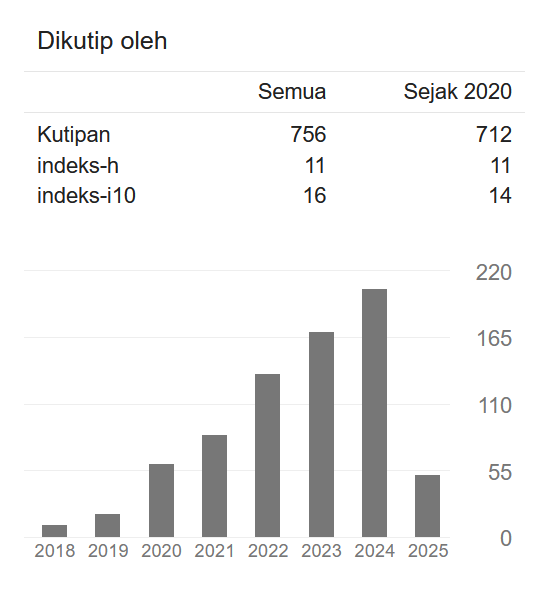KONSEP ILMU MENURUT IBNQAYYIM AL-JAWZIYYAH
DOI:
https://doi.org/10.19109/medinate.v16i1.5101Keywords:
Ibn Qayyim, Science, Ma‘rifah, HappinessAbstract
One of the challenges of contemporary Islamic thought was the secularization of science. As a result, the values of science in Islam changed, both in terms of the meaning of knowledge, tot hegoalofac achieving knowledge. From these problems, this study aimed to provide a solution by presenting the contribution of one of the previous scholars who was competent in the field of science, namely Imam Ibn Qayyimal-Jauziyah. This research included a character study research using a qualitative method, which described and analyzed Ibn Qayyimal-Jauziyah's thought which was related to the concept of science. The data collection was carried out by means of a literature study. The results of this study revealed the view of Ibn Qayyimal-Jawziyyah that science occupied an important position in the teachings of Islam. It was because of science, that humans could achieve perfect happiness. To achieve this happiness, the author found that Ibn Qayyimal-Jawziyyah mentioned the level of knowledge into three parts from the lowest to the highest level. The higher a person reached the level of knowledge, the more happiness he would get. Thus, this study tried to formulate the concept of knowledge expressed in the works of Ibn Qayyimal-Jawziyyah including Miftāh dar al-Sa'adah, Madārijal-Sālikīn. This effort was expected to provide the spirit of Muslims in studying so that they can achieve true and not false happiness.
References
Al-Attas, S. M. (1986). Dilema Kaum Muslimin. Surabaya: PT. Bina Ilmu.
Al-Attas, S. M. (2003). Islam and Secularism. Kuala Lumpur: ISTAC.
Al-Attas, S. M. (1995). Prolegomena to the Metaphysic of Islam an Exposition of the Fundamental Element of the Worldview Islam. Kuala Lumpur: ISTAC.
Al-Attas, S. M. (1995). Prolegomena to the Metaphysics of Islam. Kuala Lumpur: ISTAC.
Al-Attas, S. M. (2001). Prolegomena to The Metaphysics of Islam: an Exposition of the Fundamental Elements of the Worldview of Islam. Kuala Lumpur: ISTAC.
Al-Baghdadi, A. Q. (t.t). Al-Farqu Bainal Firaq. Beirut: Dar al-Kutub al-Ilmiyah.
Al-Ghazali. Kimiya Sa'adah.
Al-Ghazali. Ma'arijul Quds.
Al-Ghazali, A. H. (1964). Mizan al-'Amal. Mesir: Dar al-Ma'arif.
Al-Ghazali, A.-I. A. (2005). Ihya 'Ulum al-Din. Bairut: Dar Ibn Hazm.
Al-Ghazali, I. (1999). Ihya 'Ulum al-Din. Bairut: Dar al-Fikr.
Al-Isfahani. (1992). Mufradat alfaz al-Qur'an. Damaskus: Dar al-Qalam.
Al-Jauziyah, I. Q. (2004). Miftahu Dar as-Sa'adah. Jakarta: Akbar Media.
Al-Jawziyah, I. Q. Miftah dar al-Sa'adah wa mansyur wilayah al-'ilm wa al-Iradah (Vol. 1). ('. b. Qaid, Penyunt.) Dar 'alam al-Fawaid.
Al-Jawziyyah, I. Q. (2009). Madarij al-Salikin (Vol. 2). ('. a.-G. al-Fasi, Penyunt.) Bairut: Dar al-Kutub al-'Ilmiyah.
Al-Jawziyyah, I. Q. (2011). Madarij al-Salikin bayna Manazil Iyyaka na'budu wa iyyaka nasta'in. (K. b. al-'Aziz, Penyunt.) Riyadh: Dar al-Sami'i.
Al-Kurdi, A. H. Nazariyyah al-Ma'rifah baina al-Qur'an wa al-Falsafah. Riyadh: Maktab Muayyad wa al-Ma'had al-'Ali li al-Fikri al-Islami.
Al-Razy, F. a.-D. (1420). Mafatih al-Ghayb (Vol. 32). Bairut: Dar Ihya al-Turats al-'Arabi.
Bakar, O. (1997). Hierarki Ilmu. (Purwanto, Penerj.) Bandung: Mizan.
Cholik, H. F. Z.& A Arisatul. (2016). Relasi Qalb dan 'Aql menurut Imam al-Ghazali. ISLAMIA, X, 34.
Daud, W. M. (2005). Epistemologi Islam dan Tantangan Pemikiran Umat. Jurnal Islamia , 52.
Daud, W. M. (2003). Filsafat dan Praktik Pendidikan Islam Syed Mohd. Naquib al-Attas. (d. Hamid Fahmy, Penerj.) Bandung: Mizan.
Daud, W. M. (1997). The Concept of Knowledge in Islam and its Implication for Education in Developing Country. (Munir, Penerj.) Bandung: Pustaka.
Armayanto,H., dkk. (2018). Framework Studi Islam; Kajian Multidisiplin Wacana Keislaman Kontemporer. Ponorogo: UNIDA Gontor Press.
Fajari, I. A. (2016). Klasifikasi Ilmu Pengetahuan menurut Imam al-Ghazali. Kontemplasi, 04, 306.
Hasib, K. (2019). Manusia dan Kebahagiaan: Pandangan FIlsafat Yunani dan Respon Syed Muhammad Naquib al-Attas. Tasfiyah, 3.
Hasib, K. (2016). Membangun Paradigma Pendidikan Islam Berbasis Adab. Ponorogo: UNIDA Gontor Press.
Inayah, F. (2018). Tauhid sebagai Prinsip Ilmu Pengetahuan (Studi Analisis Ismail Raji al Faruqi). Tasfiyah, 2, 103.
Kathir, I. (1966). Al-Bidayah wa al-Nihayah. Bairut: Maktabah al-Ma'arif.
Katsir, I. (1990). Tafsir al-Qur'an al-'Azim (Vol. 4). Dar al-Tayyibah.
Konsep Pendidikan Islam Menurut Ibn Qayyim: Relevansinya dengan Pendidikan Modern2011RiauUIN Sultan Syarif Kasim
Mafatih Tadabur as-Sunah.
Mubaroq, H. (2008). Pengaruh Maksiat terhadap Penyakit Hati menurut Ibn al-Qayyim al-Jauziyah. Jakarta : UIN Syarif Hidayatullah .
Rahman, Z. N. (2017). Perbandingan Proses Tazkiyah al-Nafs menurut Imam al-Ghazali dan Ibnu Qayyim . al-Turath .
Rosethal, F. (2007). Knowledge Triumphant. Leiden: E.J.Brill.
Sina, I. at-Ta'liqat. Kuwait.
Tamkin, J. (2007). Pemikiran Ekonomi Ibn Qayyim al-Jawziyyah. Jurnal Ushuluddin , 91-92.
Zarkasyi, H. F. (2016). Berfikir dan Beriman. Jurnal Islamia .
Zayd, B. I. (1423). Ibn Qayyim al-Jawziyah Hayatuhu Atsaruhu Mawaariduhu. Riyadh: Dar al-'Ashimah.








